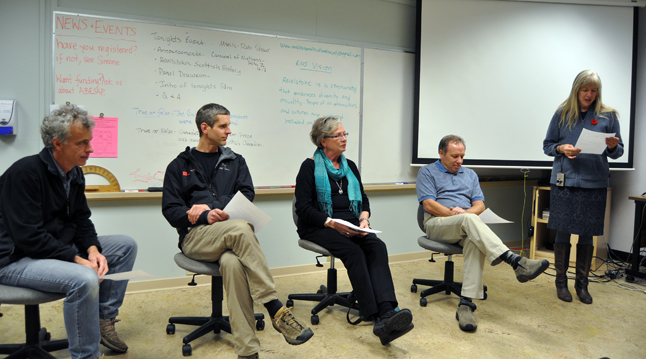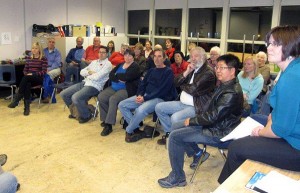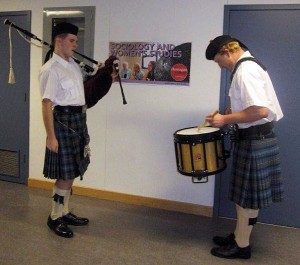
By David F. Rooney
Leaving the land of your birth can be a real adventure; whether you enjoy it or not depends entirely on your experience and whether you feel welcome or not.
For Peter Gribbon, Stuart Smith, Margaret Pacaud and Alan Mason — who participated in a panel discussion of Scottish immigration to Canada during the Multicultural Society’s Wednesday evening showing of the film, A Land as Green as the Sea, linguistic and cultural similarities and their ability to quickly find work made fitting in easier rather than difficult.
For all of them employment was a deciding factor. When Pacaud, who now works for Community Futures Development Corporation, came here in

the mid-1960s her hometown of Glasgow was a decidedly depressed place. Life is better there now, but good jobs and the prospects of a better future in Canada convinced all of them to come here. Professional Forester Gribbon was actually born in Canada when his parents lived here in the 1960s so, after being raised in Scotland, returning here was as simple as acquiring a passport.
It was a little more difficult for Pacaud, Mason and Smith but being able to speak English and having marketable skills made their entry relatively trouble-free. Smith, who works for the Canadian Avalanche Centre as its interim operations manager, came to be something more than a shoe store manager. Ironically, Canada wasn’t even a destination of choice for Mason who came to North America with a friend in the 1970s primarily to see and experience the States.
“We ended up on the West Coast and friends recommended British Columbia as a beautiful place,” he said, adding that a visit north of the border proved the truth of that. He returned to the UK and later came back as an immigrant. He is now the City’s director of Community Economic Development.
In fact, aside from family ties and nostalgic yearnings to see familiar places with centuries-old history all of them have adapted well to life in Canada in general, and Revelstoke, in particular. Anyone who knows Canadian history acknowledges the roles played by English, Scottish, Irish and Welsh immigrants who came here, first in a trickle and later in a flood after the Conquest of Quebec in 1759 and, three decades later, the American Revolution.

Revelstoke Museum Curator Cathy English told the 30 people who attended the event that Scots had been local residents from the very beginning of the city’s life. There was a St. Andrew’s Society back in 1898 and, in later years, similar organizations that celebrated Scottish culture and held events such as Robbie Burns’ Dinners, Scottish country dancing and more. While the Robbie Burns Dinners and Scottish country dancing societies faded away a few years ago, Revelstoke still boasts a Highland Pipe Band, two of whose members, Piper Jess Reid and Drummer Robert Shaw happily demonstrated their skills at the event.
As for the film, which is part of the epic A Scattering of Seeds series about immigration to Canafa, it was a poignant reminiscence about one family’s life in Canada and the way it mirrored the experience of thousands of Scots who came here after the English began dispossessing the highland Scots after the Battle of Culloden in 1746. Click here to find out more about the series. It was well worth seeing. If you haven’t seen any of the Multicultural Socieyt’s previous film and speaker events you should come out and see one of the future evening sessions. Click here to learn more about the Revelstoke Multicultural Society.
“The next immigrant Film/Speaker series event will happen the first week of December,” Society President BR Whalen said after the film. “The exact evening will depend on what else is happening around town. The next evening will honour German immigrants. We will watch The Impossible Home – Robert Kroetsch and his German Roots. I am not sure who the speakers will be yet.”



